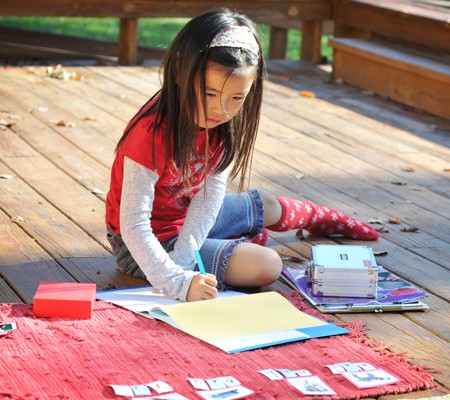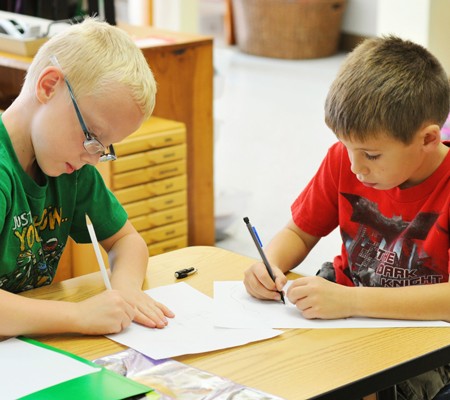“…if the idea of the universe be presented to the child in the right way it will do more for him than just arouse his interest, for it will create in him admiration and wonder, a feeling loftier than any interest and more satisfying. The child’s mind will then no longer wander, but becomes fixed and can work. The knowledge he then acquires is organized and systematic; his intelligence becomes whole and complete because of the vision of the whole that has been presented to him, and his interest spreads to all, for all are linked and have their place in the universe on which his mind is centered.” —Maria Montessori, To Educate the Human Potential
Students in the Lower Elementary Community are entering a developmental stage that Dr. Montessori called the second plane of development. She also referred to this as the age of “cosmic education.” It is an age when children become more acutely aware of and interested in the world around them. They want to understand why and how things are they way they are. They want to know more about the wider world. This more abstract and worldly thinking, combined with developing creative imagination, allows students to delve deeply into subjects like geography, history, and science. They are ready to more easily absorb abstract information, as well as being keenly interested in facts about the universe and world around them. During Lower Elementary work time, you will see students working with maps, reading quietly, collaborating with fellow students, or working in our outdoor environments.
Our Curriculum
Each year Lower Elementary begins with the First Great Lesson: The Coming of the Universe and the Earth. It is a story that ignites the imagination and students love to hear it over and over. This story, along with The Coming of Life and The Coming of Human Beings, sparks the imaginations of Lower Elementary students. The Great Lessons are the foundation on which to build, and students can begin to explore new subjects, such as astronomy, geology, the history of early humans, and the classification of animals.
Montessori’s Math and Language curriculum provide the academic foundation of Lower Elementary education. In addition, students in Lower Elementary have time in their three-year cycle to delve deeply into subjects such as atoms, matter, space, astronomy, plate tectonics, geology, fossils, the human body, animal classification, the water cycle, botany, simple machines, physics, magnetism, and electricity.
Students also participate in the ongoing study of geography, including maps and continent studies. Each year brings new continents to research, focusing on both cultural and physical characteristics. Environmental studies are also an important focus for the Lower Elementary Community. Recycling, conservation, and composting are an ongoing and everyday part of Lower Elementary life.
Lower Elementary students enjoy an enriched and stimulating environment, participating actively in class activities. Through our twice-weekly community meetings they have a voice in solving problems or expressing opinions. The students busily gather foundational knowledge and learn how to organize their time and work toward becoming productive, organized, and cooperative members of their community.
The Lower Elementary Community continues to enrich itself through studies in Music, Visual Arts, and Spanish.


